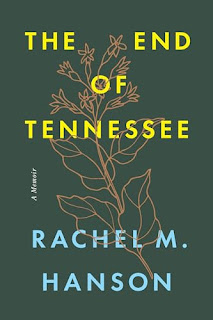The End of Tennessee by Rachel M. Hanson
Published August 2024 via University of South Carolina Press
★★★★
My mother caught me looking at a photo of her when she was in high school. She had gorgeous thick hair and the most beautiful hands with long fingernails. I was rough, a girl with bitten nails and rashes on my hips from carrying the children she kept having. As I looked at the photo, she pointed out that even after having a child, which she did soon after high school, she was thinner than me. But I wasn't wondering about her looks and why I wasn't delicate; I just wanted to know what it was like to go to school. She wouldn't let me go because she said everything I needed to know was in the home. (loc. 465*)
Hanson's upbringing was not one to envy: she grew up poor in rural Tennessee, uneducated not because the schools were bad but because her mother didn't think she needed to go to school in the first place—Hanson's place was at home. And between abuse and neglect, Hanson was often the best parent her siblings had; between abuse and neglect, there was no respite but to escape for good.
My father tells us he will not abandon his father the way his own father did. Now, as an adult, I know there are different ways of abandonment, different ways of being present and not present. (loc. 1115)
There's a certain flavor to books about rural Appalachia, about the rural South. It is not my world and never has been—I lived in the South, but in the city and outside the mountains; perhaps more to the point, my parents were happy and healthy and stable. I know the humid air of Appalachia and the gory sunsets of the mountains, but I don't know the desperation that Hanson describes.
Hanson does a beautiful job of describing a situation from which there was no good exit: no options that would not either keep her in a situation bordering on unsurvivable or sever her from everything she knew and everyone she loved. It's not an easy story to read, but it's also clear that Hanson has had the time and distance to put measured words and conclusions—as much by way of conclusions as are possible—to the story.
My mother sent that blanket to me a few years after I left home, the one time she actually had my address. In the blanket she had wrapped pictures of my younger siblings, awkwardly posed, dressed in clean clothes, but their hair was uncombed and their feet bare. I imagined those five little faces staring at the camera, their bodies longing to squirm away, annoyed by the forced posing, but curious about the attention our mother gave them in preparing them for their photos. I wondered if she had taken those just to send to me, to remind me of who I abandoned when I ran away from her. I don't need any reminding. Even my dreams are filled with the voices of my little brothers and sister—dreams that are interrupted by memories of the dark, wet mud of southern ground, the patches of drywall inside our farmhouse—dark humidity, a damp stench, a kind of prison from which escape is nearly impossible. (loc. 1588)
Thanks to the author and publisher for providing a review copy via NetGalley.
*Quotes are from an ARC and may not be final.





No comments:
Post a Comment
Note: Only a member of this blog may post a comment.